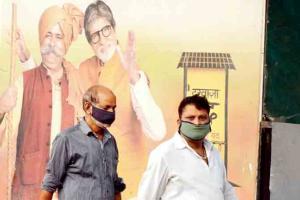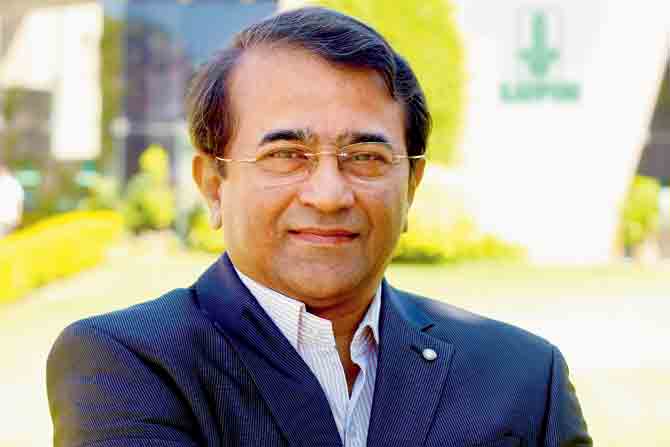Want to know if that cough is a tiny congestion or a COVID symptom? Private firms step in to help attend to citizen queries

A government poster advising precautions during a nationwide lockdown, which has been extended till May 17. Pic/ Satej Shinde
Worried about its 10,000-odd employees, spread across the country and all under lockdown, and could face medical issues at home, Lupin Limited, a pharmaceutical firm headquartered in Mumbai, decided to activate a network of physicians last month. Because these physicians also started getting queries regarding Coronavirus and its implications, the firm then added respiratory physicians and psychiatrists to its call roster. "When the initiative started getting a good response from the employees, we thought of extending the service to the public, many of whom would not have easy access to doctors," said Dr Dhananjay Bakhle, executive vice president, medical research, at Lupin. And so, last week Lupin launched the Jan Kovid helpline for Mumbai, a toll-free number where attendants answer questions in English, Hindi, Marathi and Gujarati.
I have a sore throat. Do I have COVID?" "My neighbour has had to self-quarantine. Am I at risk?" "Where can I go to get tested?"
As questions abound in a population that is both overloaded with information and yet, starved, private firms have stepped in to amp up the forces spreading awareness. While the state and central governments have their own helplines, there's also the 104 helpline that's run by the Piramal Swasthya Management and Research Institute, an initiative of Piramal Foundation, in association with state governments.

Dr Dhananjay Bakhle, executive vice president, medical research, Lupin
Paresh Parasnis, CEO, Piramal Foundation, points out that the helpline, which now functions across eight states, was first founded around 2008 in Andhra Pradesh, where in the rural areas, the firm noticed, medical facilities were difficult to access. Advice and counselling on the telephone then became an easy way to bridge the basic gap.
Giving an example, Parasnis says, if a person called with a complaint of acidity, the teams would have a series of medically validated, disease summaries and algorithms, that would help identify the cause of the pain, and generic medicines or home remedies to apply. A more serious issue would be directed to the nearest medical facility, with information of that too, being provided by the call attendants.
In early March, when news of the pandemic started being taken seriously in India, the group began training its team in responding to Coronavirus-related information. Where a daily call number across eight states would be 30,000, since March 25, Parasnis says that the number has gone up to 50,000. Dr Bakhle adds that even though their helpline hasn't been publicised much yet, they received 15 calls on the first day and 20 on the second. That's the hunger for Coronavirus-related information.

Paresh Parasnis
Both the helplines have doctors and paramedics on board. The Jan Kovid helpline (1800-572-6130), which is being run in partnership with HealthCare at Home, a firm that provides home ICU services, has also tied up with 20 chest physicians that callers can book an appointment with, for an offline consultation. If you have high fever, they will also direct you to the nearest fever clinic. And, while a tele consult with a doctor will be free for the caller, Lupin will step in and pay the doctors for their time.
Dr Gaurav Thukral, COO, HealthCare at Home, says the network of primary care physicians was available to them and when the need for disseminating Coronavirus information came, they were able to quickly step up.
As a community it is important to be careful regarding the source of information, especially during a pandemic situation. Dr Prabhat Jha, Professor of Global Health and Epidemiology at the Dalla Lana School of Public Health, University of Toronto, who spoke at a webcast titled Demystification and Dissemination of Pandemic Data, organised by Asia Society India, points out to a simple myth that no longer holds true: "A myth that foreigners were behind the virus or certain religious groups. The virus did come in with travellers from China [and new evidence suggests that perhaps even from Europe], and started in the urban areas, where there are airports. But once it arrives, the onward transmission depends on contact and physical distancing. So, community transmission was established very early on and this means that that the focus should be on expanded testing, quarantine of positives and contact tracing. It's just silly to say that certain groups are responsible for COVID-19."

Dr Prabhat Jha
He says that while disseminating Coronavirus-related information, all governments should follow guidelines by the World Health Organization (WHO). "And, the Indian government has," he says, adding that when the information is coming from any other source, beware of those trying to sell quack treatments.
At both Jan Kovid and the 104 helpline, information is given as per the Government of India and WHO sites. And with information evolving every day, Parasnis says, "Our team of clinical experts and trainers, track updates on a daily basis and then train the call attendants. We have to be on top of the game." Where the Jan Kovid helpline has five call attendants across its helplines, 104 has 1,250—150 of them were added to handle Coronavirus-related questions, after state governments reached out, asking them to increase their capacity. Of these 1,250, Parasnis says 930 are paramedics, 94 are counsellors and 97 are doctors.
The 104 helpline has received criticism for not being able to respond to questions and not being able to handle the call volume. Parasnis says while there hasn't been a case when they had to direct a call back to a state/BMC helpline, the call volumes were essentially higher than they had prepared for. "However, we have a system where we call the person back and attend to the query." Similarly, while the Jan Kovid helpline functions from 8 am to 8 pm, if you call later, your number gets registered and you get a call the next morning.

Staffers of HealthCare at Home, who are attending to calls on the Jan Kovid helpline from home, in Hindi, Marathi, Gujarati and English
In addition to physical symptoms, both helplines are also offering counselling services, connecting callers with a psychiatrist or therapist if needed. Jan Kovid, for instance, has roped in Dr Kersi Chavda and Dr Avinash D'souza.
"The BMC is running a helpline and we spoke to them and the state health minister, to see how we could supplement that effort. So many people are calling. With information that people could be asymptomatic, people worry even about a cough. Locked in, how will you access a medical opinion? This is our target audience. With telemedicine guidelines being revamped, it has become easier to provide consultations in such times," says Dr Bakhle.
Catch up on all the latest Mumbai news, crime news, current affairs, and a complete guide from food to things to do and events across Mumbai. Also download the new mid-day Android and iOS apps to get latest updates.
Mid-Day is now on Telegram. Click here to join our channel (@middayinfomedialtd) and stay updated with the latest news
 Subscribe today by clicking the link and stay updated with the latest news!" Click here!
Subscribe today by clicking the link and stay updated with the latest news!" Click here!









